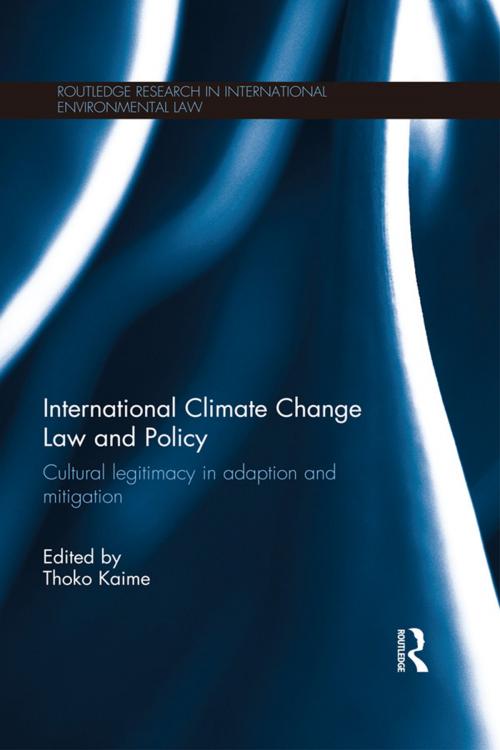International Climate Change Law and Policy
Cultural Legitimacy in Adaptation and Mitigation
Nonfiction, Reference & Language, Law, Environmental, Business & Finance, Economics| Author: | ISBN: | 9781136020568 | |
| Publisher: | Taylor and Francis | Publication: | March 26, 2014 |
| Imprint: | Routledge | Language: | English |
| Author: | |
| ISBN: | 9781136020568 |
| Publisher: | Taylor and Francis |
| Publication: | March 26, 2014 |
| Imprint: | Routledge |
| Language: | English |
Climate change poses fundamental and varied challenges to all communities across the globe. The adaptation and mitigation strategies proposed by governments and non-governmental organisations are likely to require radical and fundamental shifts in socio-political structures, technological and economic systems, organisational forms, and modes of regulation. The sheer volume of law and policy emanating from the international level makes it uncertain which type of regulatory or policy framework is likely to have a positive impact. The success or failure of proposed measures will depend on their acceptability within the local constituencies within which they are sought to be applied. Therefore there is an urgent need to better comprehend and theorise the role of cultural legitimacy in the choice and effectiveness of international legal and policy interventions aimed at tackling the impact of climate change.
The book brings together experts to present perspectives from different disciplines on the issue of international climate change law and policy. Beginning from the premise that legitimacy critiques of international climate change regulation have the capacity to positively influence policy trends and legal choices, the book showcases innovative ideas from across the disciplines and investigate the link between the efficacy of international legal and policy mechanisms on climate change and cultural legitimacy. The book includes chapters on with a theoretical basis as well as specific case-studies from around the globe. The topics covered include: land use planning as a tool of enhancing cultural legitimacy, indigenous peoples in international environmental negotiations, transnational advocacy networks, community-based forestry management and culture and voluntary social movements.
Climate change poses fundamental and varied challenges to all communities across the globe. The adaptation and mitigation strategies proposed by governments and non-governmental organisations are likely to require radical and fundamental shifts in socio-political structures, technological and economic systems, organisational forms, and modes of regulation. The sheer volume of law and policy emanating from the international level makes it uncertain which type of regulatory or policy framework is likely to have a positive impact. The success or failure of proposed measures will depend on their acceptability within the local constituencies within which they are sought to be applied. Therefore there is an urgent need to better comprehend and theorise the role of cultural legitimacy in the choice and effectiveness of international legal and policy interventions aimed at tackling the impact of climate change.
The book brings together experts to present perspectives from different disciplines on the issue of international climate change law and policy. Beginning from the premise that legitimacy critiques of international climate change regulation have the capacity to positively influence policy trends and legal choices, the book showcases innovative ideas from across the disciplines and investigate the link between the efficacy of international legal and policy mechanisms on climate change and cultural legitimacy. The book includes chapters on with a theoretical basis as well as specific case-studies from around the globe. The topics covered include: land use planning as a tool of enhancing cultural legitimacy, indigenous peoples in international environmental negotiations, transnational advocacy networks, community-based forestry management and culture and voluntary social movements.















